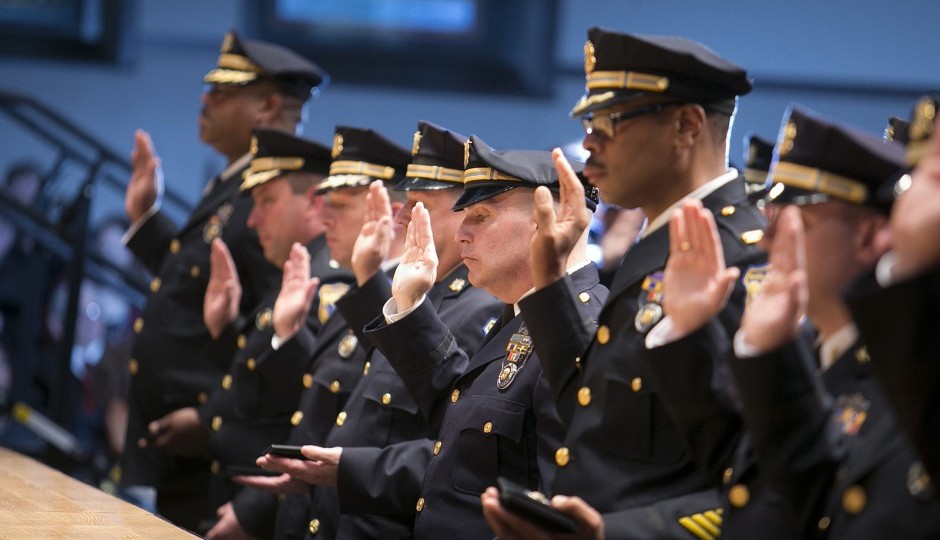The Brief: Police Shootings Plummet 62% in Philadelphia

A Philadelphia Police Department promotion ceremony. | Copyright City of Philadelphia. Photo by Mitchell Leff.
1. Police shootings fell 62 percent between 2012 and 2014.
The gist: 2012 marked a modern high for police shootings: City cops fired at civilians 104 times that year, killing 16 and injuring 32. Last year, the number of shootings dropped significantly. Philly.com reports that police fired at civilians 40 times in 2014, killing four and injuring 21; so far this year, they killed one person and wounded seven. “This is exactly what we want to see,” Kelvyn Anderson, the director of the watchdog group Police Advisory Commission, told Philly.com. “Whatever the department is doing, this is exactly where we want it to go.”
Why it matters: Obviously, even one police shooting annually is one too many. But this is a major decline. With police shootings sparking outrage around the country, could Philly’s experience be replicated elsewhere? David Rudovsky, a civil rights lawyer, told Philly.com that Police Commissioner Charles Ramsey has written department rules “to establish that human life is a priority and that the use of deadly force should only [take place] when there is imminent danger to the officer or to someone else.” Police have also undergone “reality-based training” in order to be better equipped in dangerous situations in which shootings may occur. It’s too soon to declare that Philadelphia is any sort of best practice, however. After all, the U.S. Department of Justice issued a highly critical report on police shootings in Philly as they were already dropping. And Ramsey himself said it’s “too early” to draw conclusions about this year’s trends.
2. It’s looking more and more like Philly schools will get screwed by Harrisburg this year.
The gist: The state budget is supposed to get done by next Wednesday, but things aren’t looking good. The Republicans that control Pennsylvania’s House and Senate are putting together a budget with no tax hikes, the AP reports. GOP lawmakers also say their plan will contain a smaller boost in education funding than Democratic Gov. Tom Wolf has proposed, and it will likely count on revenues from liquor privatization and pension reform. Wolf says he’ll veto such a plan.
Why it matters: Without a grand compromise over liquor, pensions or perhaps charter schools, it seems unlikely that Republicans will support a windfall to Philly schools. The district is poised to receive an increase in state funding, sure, but it may be so small that it only maintains the status quo — a/k/a the same inadequate resources that the district has today.
3. Speaking of Harrisburg, Jim Kenney sojourned there this week.
The gist: John Baer of the Daily News reports that the city’s presumptive next mayor, Democrat Jim Kenney, visited Harrisburg this week to meet with Wolf as well as Republican leaders in the House. Kenney said the talks were “cordial, not substantial,” with the idea being to “introduce myself to those don’t know me and re-introduce myself to those who do.”
Why it matters: Mayor Michael Nutter may not have had the best relationship with City Council, but his squeaky clean reputation endeared him to Republicans in Harrisburg. If elected mayor as expected, will Kenney be able to maintain that level of respect? (And, some would ask, did Nutter get anything in return for it anyway?) Kenney’s well-known temper may get in the way of that — or maybe it won’t, if he is able to remain as cool-headed as he has been on the campaign trail. One thing going for Kenney: Nutter and City Council President Darrell Clarke have been criticized for failing to present a united front to state lawmakers. Clarke endorsed Kenney, so that probably wouldn’t be a problem, at least not in the beginning of his term.
Connect with Citified
- Send tips to citified@phillymag.com.
- Sign up for the weekly Citified newsletter and never miss our best work.
- Follow us on Twitter @CitifiedPHL.
- Follow our writers on Twitter: @pkerkstra, @hollyotterbein, @malcolmburnley.